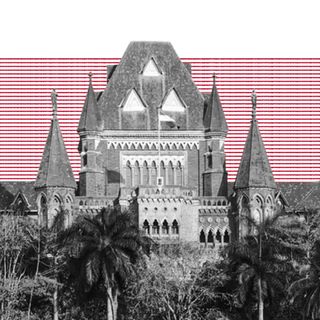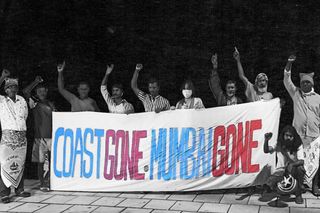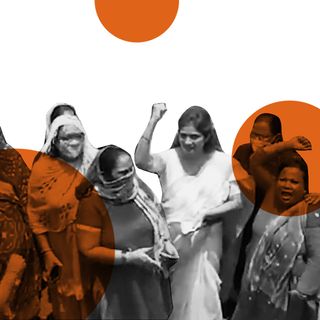
Mumbai Fish Workers Escalate Protest Against Displacement, Loss of Livelihood
The municipal body demolished a fish market in Dadar earlier this month, allegedly without informing the fish workers.

Frustrated by the lack of cooperation from the Brihanmumbai Municipal Corporation (BMC), fish workers from the Koli community in Mumbai are escalating their protests by staging one outside the BMC headquarters today and tomorrow. Earlier in August the BMC demolished a thriving fish market in Dadar (a central area in Mumbai for fish trade). The fish workers suffered severe losses by this move. The escalation of the protest outside the BMC headquarters is aimed to amplify the inadequate compensation they were offered for their sustained losses. Fish workers are also demanding rehabilitation and resettlement for the same.
The call for protesting against the relocation had been issued by the Akhil Maharashtra Machhimar Kriti Samiti’s (AMMKS), where groups will also come together to protest the ongoing Coastal Road Project.
The BMC cited traffic jam concerns as the reason for the Dadar market demolition, a move that fish workers claim caught them unaware. Although the community was offered resettlement in Airoli, the community claims that there are no arrangements in the area for markets and are hence refusing to be resettled there.
This protest is set against the backdrop of threats to fish workers’ livelihood coming from multiple directions. The community began their protests on 22nd August near Haji Ali in Mumbai and has called for the continuation of protests in the days to come. The main demand of the fishing community is the rehabilitation of fishing markets, which have suffered in recent years due to development projects undertaken without their consultation or consent, and due to demolition and resettlement taking place without adequate or prior notice.
The Koli community, one of the indigenous original inhabitants of Mumbai, depend on fishing for a livelihood. But with massive redevelopment projects looming ahead, the community faces an uncertain future due to the adverse effects on the marine ecosystem and their precarious claim over the land to be acquired for redevelopment. The result is a tussle between development authorities and the fishing communities, in a struggle over loss of livelihood and lack of proper resettlement.
The Dadar market demolition is the latest in a series of events that have posed a grave threat to the community’s livelihood. Members of the Vanchit Macchimar Sahakari Sangathana, a collective of fish workers, claim that nearly 2,500 families stand to be affected due to the ongoing Coastal Road project, according to the Free Press Journal. The Coastal Road is an upcoming 8-lane freeway that, if constructed, threatens Mumbai’s coastline.
The project was first proposed in 2011 — although Coastal Regulation Zone rules mandated that bridges be constructed to ensure the natural flow of water bodies, these rules were later amended for “special cases” and have effectively nullified these protections. While the original rules protected fishing communities from being resettled without infrastructure or amenities, these protections were removed in 2019 despite 90% of representatives objecting to the change.
The project is a massive undertaking that stands to benefit only a small section of society i.e. car-owners in Mumbai. The project aims to make car owners’ commute smoother, leaving entire communities and fishing villages in the lurch.
While the goal is to decongest road traffic, its undersea tunnels threaten marine ecology and biodiversity, creating another vector of attack on the livelihood of the Koli community. The project threatens to completely wipe out several fishing villages on the Western side of Mumbai’s coast, Firstpost reported.
Related on The Swaddle:
Lakshadweep Govt Goes Ahead With Ecotourism Projects Despite ‘Grave’ Ecological Concerns
Moreover, environmental activists claim that the BMC had not obtained the necessary environmental clearances for the project.
This is not the first time that large-scale projects threatened the very identity of the Koli community. Mumbai’s Mangrove forests have been under constant threat, and are among the first to be destroyed in favour of building residential complexes. In order to compensate, authorities expand mangrove cover in other regions — this affects how fishing communities are able to carry out their job.
“I could not continue the family occupation as the number of fish have gone down. I am doing contractual work for my family. My children can not swim, we are losing our identity,” a member of the community told The Wire, while speaking about the impact of mangrove expansion on the community.
Overall, as one of the original inhabitants of the city, the Koli community struggles to be heard and is constantly used as a pawn in development projects.
“We are in debt, crisis, and deep distress. We have lost all of our nets, our vessels, and even our boats. We were to be compensated, but we have not received anything,” Sanjay Baikar, the secretary of the Vanchit Machimaar association, told NewsClick.
“The government has used the COVID crisis to carry out these operations. We are even scared to speak up, we could be intimidated or harassed.”
Rohitha Naraharisetty is a Senior Associate Editor at The Swaddle. She writes about the intersection of gender, caste, social movements, and pop culture. She can be found on Instagram at @rohitha_97 or on Twitter at @romimacaronii.
Related


Notions Of Sexuality Can Change After Reading Theories of Its Non‑Rigidity: Study
